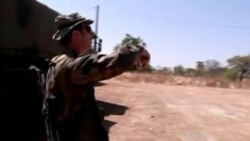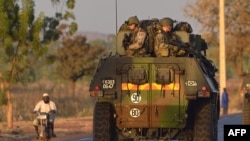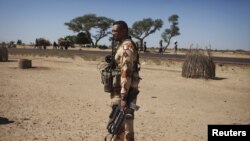LONDON —
France has launched a land assault in Mali that will put its soldiers in direct combat with Islamist militants in the north of the country. As its soldiers headed north on Wednesday, France's European neighbors mulled how best to give their own support in the escalating conflict.
European foreign ministers are due to meet Thursday to discuss the crisis but experts say they are unlikely to join France in direct combat.
France has 800 troops already on the ground in Mali. Their numbers are set to swell to 2,500 - a sign that France is wading deeper into the military conflict now going on in its former colony.
But so far it is unclear what help France will get from its European neighbors. Logistical support has begun to trickle in.
Belgium sent a C-130 transport plane to Africa’s west coast on Wednesday with 35 soldiers onboard - another C-130 and two medical helicopters are also on their way.
On Tuesday a British RAF C-17 cargo plane, loaded with military equipment, landed at Mali's airport in Bamako. Germany, Italy and Denmark are also giving logistical support.
On Tuesday European Union Foreign Policy Chief Catherine Ashton said stability in Mali is important for the whole of Europe.
"We are directly impacted by the situation there. Because terrorist groups based in northern Mali use this territory that they control for all kinds of traffic, for drugs and arms smuggling," she said. "They've taken many hostages, many of them originated from European member states. So under no circumstances can we be indifferent to the situation."
She said the European Union (EU) will speed up and adapt plans that were made in December to train Mali’s military for battle with Islamist rebels.
Hundreds of European troops are set to help in the training - but the conflict’s recent escalation raises questions over whether European troops will be brought onto the battlefield, says Paul Melly, a French Africa expert with Britain's Chatham House.
"The Europeans were going to be working alongside the Malian units they were training," he said. "They were not going to be just back in training bases - even under the original plan. And now the Malian army could well face situations where it is in combat pretty soon and if it’s got European advisors alongside they may themselves also be in the theater but we do not know exactly, the details have yet to be confirmed.”
The Islamist militants seized control of northern Mali after a March coup toppled the Malian government and left a temporary power vacuum.
The Economic Community of West African States, or ECOWAS, has been planning an intervention force for months, with the support of the United Nations.
Melly says those troops - not more from Europe - are what is needed.
"I’m not sure that a shortage of European soldiers on the ground is really the issue," he said. "The French have indicated plans to deploy up to 2,500 but they want, everybody wants West African forces to then take over a large part of the actual military operation on the ground because that’s what had originally been planned.”
ECOWAS Chair Alassane Ouattara said Wednesday that the group wants to deploy troops quickly.
European foreign ministers are due to meet Thursday to discuss the crisis but experts say they are unlikely to join France in direct combat.
France has 800 troops already on the ground in Mali. Their numbers are set to swell to 2,500 - a sign that France is wading deeper into the military conflict now going on in its former colony.
But so far it is unclear what help France will get from its European neighbors. Logistical support has begun to trickle in.
Belgium sent a C-130 transport plane to Africa’s west coast on Wednesday with 35 soldiers onboard - another C-130 and two medical helicopters are also on their way.
On Tuesday a British RAF C-17 cargo plane, loaded with military equipment, landed at Mali's airport in Bamako. Germany, Italy and Denmark are also giving logistical support.
On Tuesday European Union Foreign Policy Chief Catherine Ashton said stability in Mali is important for the whole of Europe.
"We are directly impacted by the situation there. Because terrorist groups based in northern Mali use this territory that they control for all kinds of traffic, for drugs and arms smuggling," she said. "They've taken many hostages, many of them originated from European member states. So under no circumstances can we be indifferent to the situation."
She said the European Union (EU) will speed up and adapt plans that were made in December to train Mali’s military for battle with Islamist rebels.
Hundreds of European troops are set to help in the training - but the conflict’s recent escalation raises questions over whether European troops will be brought onto the battlefield, says Paul Melly, a French Africa expert with Britain's Chatham House.
Foreign Troop Commitments to Mali
Foreign Troop Commitments to Mali- France 2,000 on the ground, 500 more committed
- Chad to send 2,000
- Nigeria to send 1,200
- Benin to send 650
- Burkina Faso, Niger, Senegal, Togo have committed 500 each
- Guinea and Ghana are also sending troops
The Islamist militants seized control of northern Mali after a March coup toppled the Malian government and left a temporary power vacuum.
The Economic Community of West African States, or ECOWAS, has been planning an intervention force for months, with the support of the United Nations.
Melly says those troops - not more from Europe - are what is needed.
"I’m not sure that a shortage of European soldiers on the ground is really the issue," he said. "The French have indicated plans to deploy up to 2,500 but they want, everybody wants West African forces to then take over a large part of the actual military operation on the ground because that’s what had originally been planned.”
ECOWAS Chair Alassane Ouattara said Wednesday that the group wants to deploy troops quickly.







